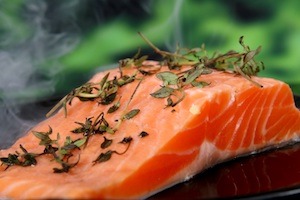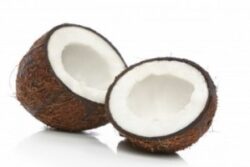Fats and Cancer: Part Two
June 25, 2014 | Author: Susan Silberstein PhD
Are fats good or bad for you? The answer is YES — it depends on the type. Salmon is a great example. All salmon is rich in protective omega-3 fats, but farmed salmon has three times the saturated fat that wild salmon has, as well as multiple times the chemical toxins (which remain stored in the fat).
Dietary fat and its effects on health are part of a complex research field known as lipid chemistry, and I am certainly not a biochemist. However, I can summarize the major aspects of this complicated topic that should be of interest to BeatCancer.org fans.
In my previous article about fats and cancer, I wrote about the relevance of the amount of fat to cancer protection. Now I want to focus on the equally if not more important issue of choosing the right types of fats. Natural fats contain varying ratios of three types of fats: saturated, monounsaturatedand polyunsaturated.
Saturated Fats
In looking at types of fats and their role in promoting or preventing cancer growth, the first distinction is between saturated fats (largely from animal sources) and unsaturated fats (from plant sources). It is generally believed that saturated fats tend to promote cancer while unsaturated fats tend to protect against cancer.
Research has shown, for example, a clear correlation between estrogen receptor positive breast cancer and high saturated fat intake. In a large European study evaluating more than 337,000 women in 10 countries over 11 years, researchers found that women who ate the most saturated fat were about 30 percent more likely to develop breast cancerthan those who ate the least. Other studies indicate a positive association between intake of saturated fat, animal fat and colon cancer risk.
 However, there is more to the story, and certain saturated fats are better for you than some unsaturated fats. There is a major difference between the naturally saturated fats in butter, especially raw butter, and artificially hardened fats in margarine and shortening. In this regard, this week’s Time magazine cover story on butter echoes research-based claims that the Westin A. Price Foundation has been making for years that “butter is better.” More on that later.
However, there is more to the story, and certain saturated fats are better for you than some unsaturated fats. There is a major difference between the naturally saturated fats in butter, especially raw butter, and artificially hardened fats in margarine and shortening. In this regard, this week’s Time magazine cover story on butter echoes research-based claims that the Westin A. Price Foundation has been making for years that “butter is better.” More on that later.
Extra virgin organic coconut oil, which is 90% saturated fat, also appears to be a good choice. According to top lipid researcher Mary Enig, PhD, biochemists classify fatty acids not only by their saturation, but also by their length. Medium-chain fatty acidsfound mostly in butterfat and tropical oils like coconut and palm oil have antimicrobial properties, are absorbed directly for quick energy, and contribute to the health of the immune system.
In my next blog, I will discuss which unsaturated fats are really healthful and which ones can increase your cancer risk. Stay tuned.
Join the conversation: Ask Holistic Cancer Coach Facebook Group
References:
[1] Coles T. Coconut oil benefits: 12 facts about this wonderful ingredient. http://www.huffingtonpost.ca/2013/10/25/coconut-oil-benefits_n_4164278.html
[2] Enig M and Fallon S. The Skinny on Fats. http://coconutoil.com/truth_saturated_fats/
[3] http://www.westonaprice.org/health-topics/why-butter-is-better/
[4] Menendez JA et al. Oleic acid, the main monounsaturated fatty acid f olive oil, suppresses Her-2/neu expression. Annals of Oncology Jan 10, 2005
[5] Sieri S, Chiodini P et al. Dietary Fat Intake and Development of Specific Breast Cancer Subtypes. Journal of the NationalCancer Institute. http://jnci.oxfordjournals.org/content/early/2014/04/04/jnci.dju068.abstract
[6] Walsh, B. Eat Butter. Time Magazine, June 23, 2014, 28-35
[7] Reddy BS. Types and amount of dietary fat and colon cancer risk. Environ Health Prev Med. Jul 2002;7(3);9-102. http://www.ncbi.nlm.nih.gov/pmc/articles/PMC2723490/
